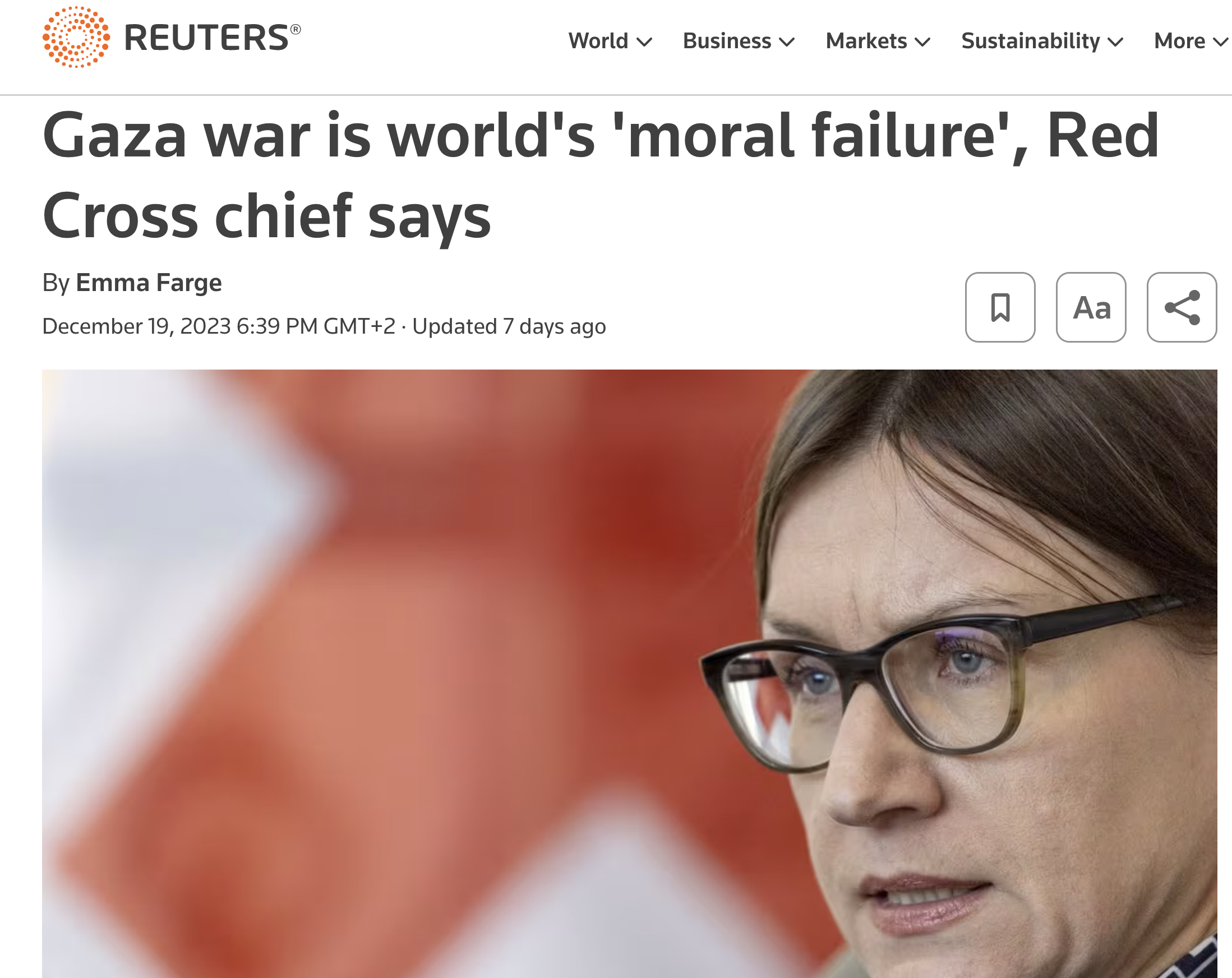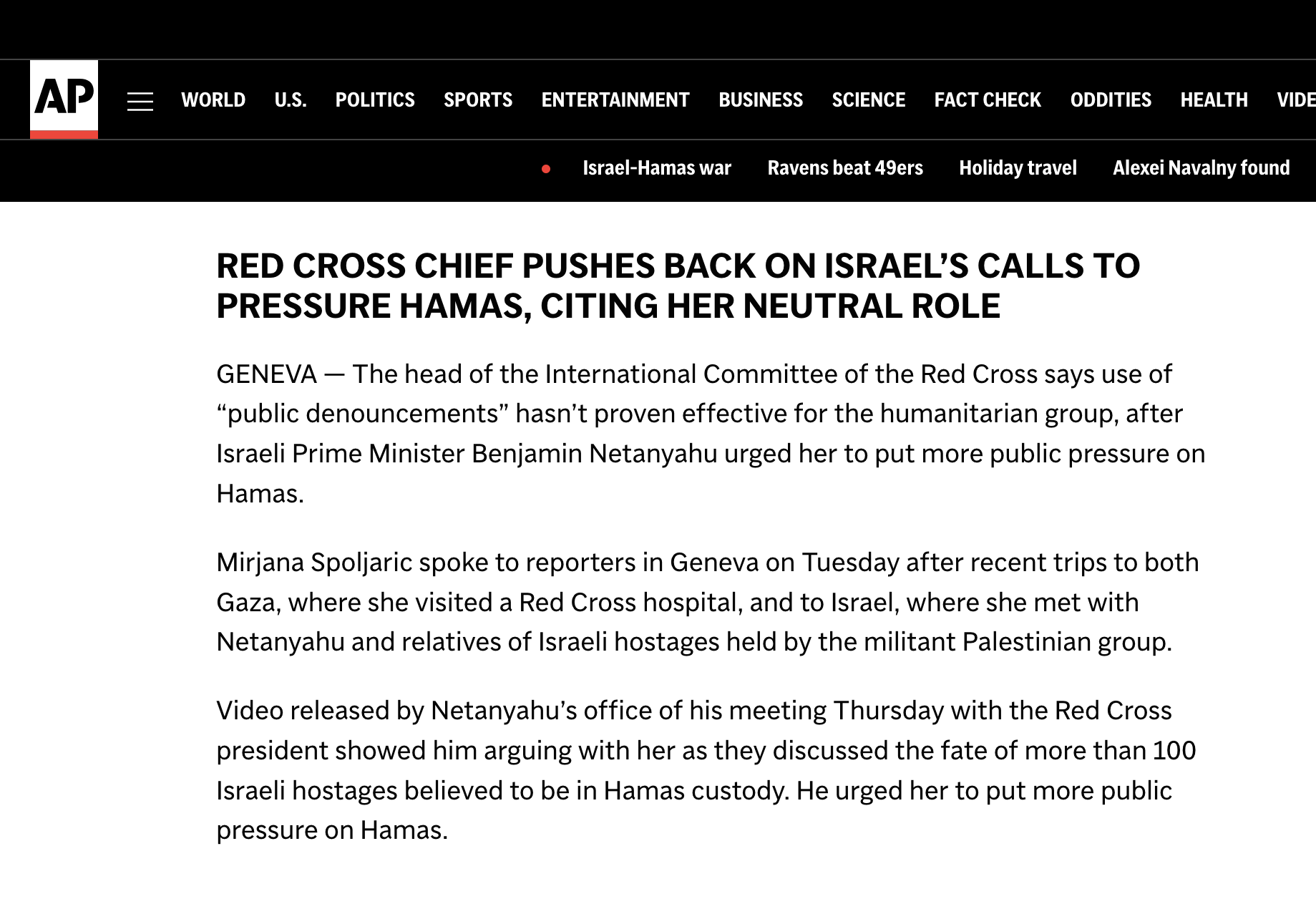Two stories on the International Committee of the Red Cross (ICRC)’s handling of the Israel-Hamas war deserved coverage last week: Comments on the situation in Gaza by the organization’s head and the filing of a lawsuit against it over its failure to help Israeli hostages.
Unfortunately, major news agencies echoed the former but were completely silent on the latter.
This selective omission focused all attention on the plight of Palestinians in Gaza at the expense of the suffering of Israelis held hostage by Hamas.
This view was further promoted by two factors: The media’s blindness to the Red Cross’s responsibility for the Israeli hostages and the glorification of the organization’s humanitarian role.
Reuters and AP Reveal and Conceal
On December 19, Reuters gave a platform to Red Cross President Mirjana Spoljaric, who had spoken to journalists after her visit to Israel and Gaza.

The headline, “Gaza war is world’s ‘moral failure’, Red Cross chief says” could be seen as judgmental — was Israel supposed to refrain from going to war after the brutal Hamas massacre of its citizens on October 7? Isn’t it a moral failure for the world to not consider such a war morally justified?
Regardless, the piece gives a balanced account, presenting Israel’s criticism of the Red Cross followed by the president’s response.
Although the ICRC facilitated the release of hostages during the truce, the group has been criticised by some Israelis for not doing more to free others and provide them with medical care. Some social media users have equated it to a taxi service to drive hostages out of Gaza.
“You don’t just go there and take the hostages and bring them out,” Spoljaric said, saying that any analogy with an Uber or taxi service was “unacceptable and outrageous.”
AP took the same approach. Its report, included on a live-updates page, led with Spoljaric’s counter-claims against Israel’s criticism:

Clearly, countering the criticism against the Red Cross was high on the agenda of both the organization’s president and the journalists covering her comments.
The problem was that two days later, both Reuters and AP ignored the manifestation of the very criticism they had mentioned by choosing not to cover the filing of an Israeli lawsuit against the Red Cross.
The lawsuit was filed in a Jerusalem court by an Israeli NGO on behalf of the families of 24 of the 240 Israelis abducted by Hamas during the deadly October 7 massacre. It accuses the aid organization of failing in its mission and seeks about $2.8 million in damages.
Related Reading: ICRC’s Twitter Campaign Shows its Obsession With Israel (Video)
By any journalistic standard, with or without previous coverage of the Red Cross president’s position, the lawsuit should have been covered — as it was by The New York Times, Newsweek and AFP.
But when the world’s two leading news agencies ignore it, especially after giving center stage to the narrative of the Red Cross, it’s problematic. Could it be that as a stand-alone, the story couldn’t be “framed” the “right” way? Was it too “pro-Israel”?
A look at a recent mention of the Red Cross in an unrelated AP story reveals the hidden bias:
Hamas called on the International Committee of the Red Cross and other organizations to pressure Israeli authorities to reveal the whereabouts and conditions of people detained.
With no mention of the Red Cross’s role regarding Israeli hostages, the one-sided assumption here is that the organization should answer only to the Palestinian side — which in this case is represented by Hamas, a terrorist organization.
Hypocrisy #1: @AP reports that Hamas has called on the Red Cross to pressure Israeli authorities to reveal the whereabouts & conditions of detained Gazans.
Hypocrisy #2: AP won’t mention the Red Cross’s failure to access Israeli hostages held by Hamas.https://t.co/pYhHM7QFRf
— HonestReporting (@HonestReporting) December 24, 2023
CNN’s Blindness and Glorification
A look at how CNN recently interviewed a Red Cross employee in Gaza provides further evidence of the erasure of Israeli suffering from the agenda by the Red Cross and media alike.
The interviewer starts by asking for the employee’s reaction to a new Israeli offer to pause the fighting and allow more humanitarian aid into Gaza as part of a new hostages-prisoners release deal.
What follows is the Red Cross employee talking solely about the dire situation in Gaza, with no clear mention of the Israeli hostages. The interviewer does not push back and does not inquire about the Red Cross’s failure to reach them.
CNN also recently published a puff piece on the Red Cross. Titled ‘In the line of fire:’ The crucial, neutral role the Red Cross plays in conflicts,” the report glorified the organization’s role in the release of Israeli hostages from Hamas captivity.
While it did mention the criticism of hostage families who had said the Red Cross was nothing more than “an Uber for released hostages,” the piece needlessly included lengthy historical background on the important role of the “honored” humanitarian organization:
Founded in Geneva in 1863, the ICRC is the oldest and one of the most honored humanitarian organizations in the world.
A three-time Nobel Peace Prize winner, winning the award during the two World Wars and on the centenary of its creation, the ICRC operates in more than 100 countries, supporting those affected by war, natural disasters and other global crises through a humanitarian network of some 80 million people.
But the article conveniently skipped the organization’s darkest historical chapter, when it had failed Europe’s Jews during the Holocaust.
In light of the omissions and glorifications, it should come as no surprise that there was also no coverage of Israel’s claim that the Red Cross had refused to transfer life-saving medicine to Hamas hostages.
The media also have not mentioned that the newly appointed director-general of the Red Cross is a controversial former head of UNRWA, the United Nations agency for Palestinian refugees.
When media selectively conceal and reveal information in order to maintain the narrative of a holier-than-thou aid organization that helps desperate Gazans and has come under unjust criticism by Israel, they violate their most basic journalistic mission: objectively report the facts.
The result is two-fold: news consumers are prevented from knowing the entire story, and they are also robbed of their ability to independently pass judgment on events.
Subtly, media have already told them what to think.
Liked this article? Follow HonestReporting on Twitter, Facebook, Instagram and TikTok to see even more posts and videos debunking news bias and smears, as well as other content explaining what’s really going on in Israel and the region. Get updates direct to your phone. Join our WhatsApp and Telegram channels!
Image credit: Wafa via Wikimedia Commons



